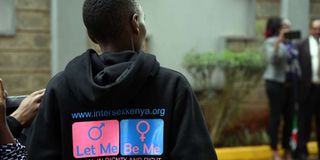Time ripe for Kenya to recognise third gender

An intersex person follows proceedings at Kenya National Commission on Human Rights offices in Nairobi on July 9,2018 during the launch of nationwide data collection on Intersex persons in Kenya.
What you need to know:
- Intersex persons have been in existence for time immemorial, communities have been biased against them.
- Majority have limited access to education and health services, experience non-consensual corrective surgery before age of consent, have identity conflicts and are encumbered with hostile and tedious bureaucratic processes in changing their legal identities.
- National registration and documentation protocols like IDs, Huduma numbers, passports and birth and death certificates must be revised to capture this dynamic.
Anyone who has travelled by air is familiar with the on-board welcoming remark “Ladies and Gentlemen”. But you will no longer hear it on Japan Airlines, which opted to use gender-neutral terms from October 1, 2020 after it adopted a pilot charter on the rights of lesbian, gay, bisexual and transgender persons. It might not be long before other airlines follow suit given institutional penchant for politic correctness. The move shows that what we have always taken for granted must be revisited.
The need to recognise diverse gender identities led to establishment of the Taskforce on Policy, Legal, Institutional and Administrative Reforms Regarding Intersex Persons in Kenya by the Attorney-General on May 26, 2017. Among other things, the taskforce was mandated to recommend reforms to safeguard the interests of intersex persons.
Noting that there are 46 intersex conditions, the taskforce defined an intersex individual is “a person conceived and born with a biological sex characteristic that cannot be exclusively categorised in the common binary of female or male due to inherent and mixed anatomical, hormonal, gonadal (ovaries and testes) or chromosomal patterns which could be apparent prior to or at birth, and in childhood, puberty or adulthood”. It noted that although intersex persons have been in existence for time immemorial, communities have been biased against them.
Corrective surgery
Majority have limited access to education and health services, experience non-consensual corrective surgery before they reach the age of consent, have identity conflicts and are encumbered with hostile and tedious bureaucratic processes in changing their legal identities. Many have also had their privacy invaded by law enforcement officers.
While highlighting that 0.05 per cent to 1.7 per cent of babies worldwide, are born intersex, the taskforce recognised that the High Court of Kenya had in 2014, “upheld the rights of intersex persons to non- discrimination and … to protection from torture, cruel, inhuman and degrading treatment” as provided for under Article 27 (4) of the Constitution.
Human rights violations
It further acknowledged that the Departmental Committee on Administration and National Security of the 11th Parliament in 2017 made recommendations including on the need for introduction of an Intersex (I) marker to identify such persons, public awareness, generation of statistics, access to healthcare, and redress for human rights violations.
Additionally, the Kenya National Commission on Human Rights had written an advisory to the Kenya National Bureau of Statistics on March 9, 2018, with regard to the national Census or other socio-economic surveys. Consequently, the 2019 Census created a new demographic category and established that intersex persons constituted 0.2 per cent of Kenya’s population. This was a landmark acknowledgement, which calls for an overhaul of our way of thinking, laws, documentation systems, planning and service provision.
First, all national registration and documentation protocols like IDs, Huduma numbers, passports and birth and death certificates must be revised to capture this dynamic. The taskforce recommends amendment of the Births and Deaths Registration Act Cap. 149, Registration of Persons Act Cap. 107, Interpretation of General Provisions Act Cap. 2, Kenya Citizenship and Immigration Act, Cap 172, and the Children’s Act, 2001.
Corrective rape
Second, there must be legal protection of intersex persons from stigma, embarrassment and attacks. In countries such as South Africa, lesbians have been exposed to what is referred to as “corrective rape” by bigots who consider heterosexuality the only acceptable norm. In fact, Kenya’s Marriage Act must reconsider its definition of marriage to allow this group to legally enter into marital unions without encumbrances.
Third, health service providers must allocate services for this group and train staff on how to handle them with utmost respect and confidentiality. The taskforce asks the State to establish a fund to cater for “all medical-related interventions for intersex persons due to the high cost implications”.
Fourth, writers and other communicators must start using language that acknowledges this reality and depicts intersex persons in positive and empowering light. Fifth, our educational curriculum must include awareness on gender diversity. Most critical, the society must change its attitude and avoid gender-based biases, discrimination and bigotry.
Affirmative action
Particularly important will be the faith-based sector which tends to hold puritanical and rigid views about sexuality. From a political perspective, we must also start thinking of affirmative action to ensure that the third gender is included in representation and is heard and incorporated in decision-making.
Only by doing the above will we be true to the international human rights treaties we are party to. In the meantime, do not be guilty of discrimination by continuing to think in terms of “Ladies and Gentlemen”.
The writer is an international gender and development consultant and scholar. ([email protected])





